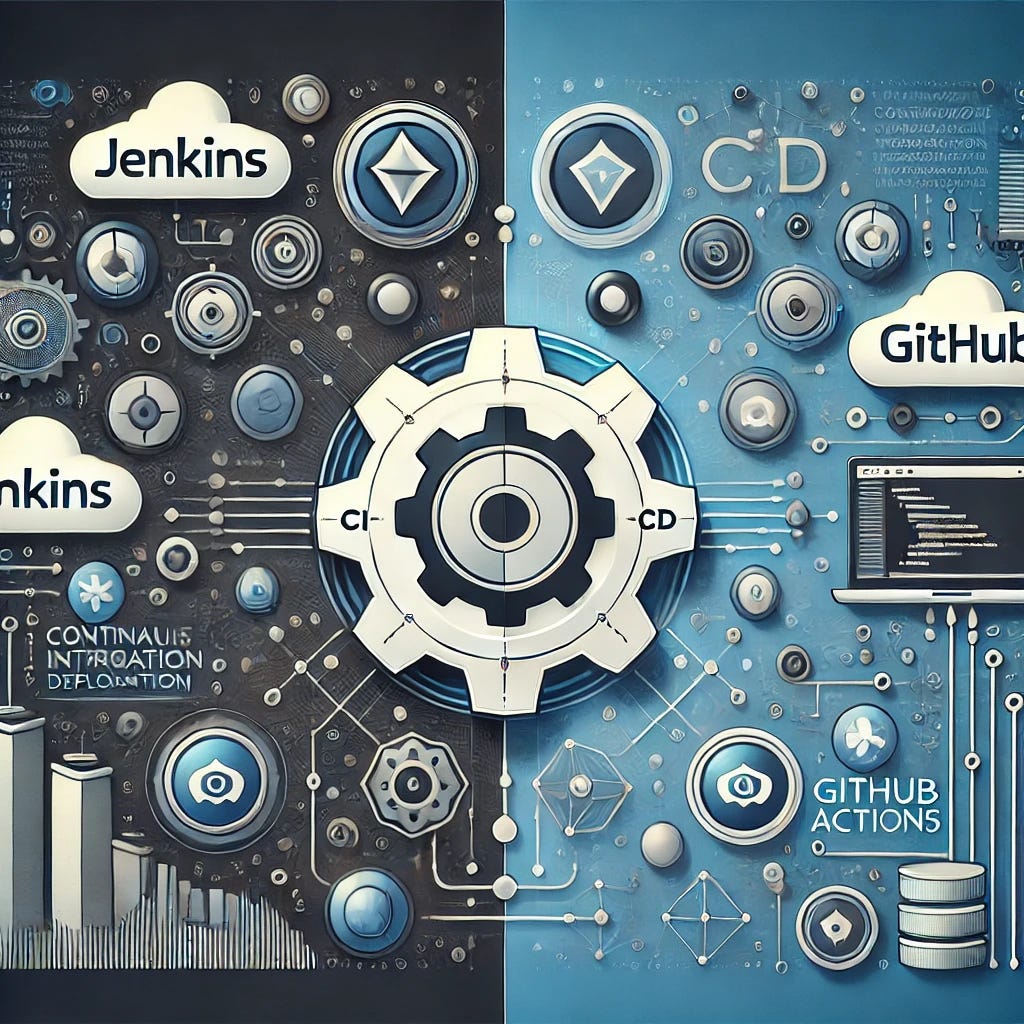Jenkins vs. GitHub Actions: How to Choose the Best CI/CD Tool for Modern DevOps.
Two industry leaders on the CI/CD automation list are Jenkins and GitHub Actions.
In today's world of accelerated software development, Continuous Integration/Continuous Deployment (CI/CD) pipelines form an essential part of delivering features as fast and reliably as possible and without fail. Two industry leaders on the CI/CD automation list are Jenkins and GitHub Actions. Each offers a distinctive set of strengths and utilities that are appropriate to other project needs; the distinction between them, therefore becomes critical in helping optimize DevOps workflow. Let us explore their features, strengths, and best-suited use cases.
Jenkins: The Veteran in CI/CD Automation
Jenkins is an open-source automation server with a rich legacy of flexibility, customization, and wide community support. It has been a favorite for years in the DevOps world because it can cater to a wide range of automation tasks and workflows.
Key Features of Jenkins:
Flexibility with Plugins: Jenkins has more than 1,800 plugins and is therefore compatible with almost any kind of tool, service, or framework. You want to connect specifically to a code repository or a testing tool or just to a deployment service-that's most probably a plugin for Jenkins. This option makes it suitable for all complex, custom CI/CD workflows.
High Customization: Jenkins also supports both GUI-based configuration and code-based pipelines via Scripted Pipeline or Declarative Pipeline syntaxes. This dual approach allows developers granular control over their CI/CD processes. 3. Open-Source Control: Being an open-source tool, Jenkins can be installed on your own infrastructure or a managed service. This gives complete control over your CI/CD environment, making it ideal for organizations with strict security or compliance requirements.
Community and Support: Jenkins has a large, vibrant community that develops plugins, fixes, and documentation. This support network enables developers to quickly troubleshoot problems and find new features.
Benefits of Jenkins:
Large Ecosystem: It has a very large library of plugins to support many integrations.
Custom Infrastructure: You decide where and how Jenkins runs, allowing for flexibility in self-hosted environments.
Mature and Battle-Tested: Proven reliability for enterprise-level and large-scale CI/CD automation.
Complex Workflows: Suitable for highly intricate pipelines requiring multiple integrations and conditional logic.
Challenges with Jenkins:
Steep Learning Curve: The flexibility and customization options come at the cost of complexity, making Jenkins harder to learn for beginners.
Maintenance Overhead: Managing Jenkins servers, plugins, and updates can be time-consuming and resource-intensive.
Scalability Issues: Scaling Jenkins requires managing infrastructure manually, which may not be ideal for rapidly growing projects.
GitHub Actions: The Rising Star
GitHub Actions is an integrated, modern CI/CD solution developed directly into the GitHub platform. Released in 2019, it has gained popularity pretty fast because of its ease of use and seamless integration with GitHub repositories.
Key Features of GitHub Actions:
Seamless GitHub Integration: GitHub Actions feels like a very natural extension of GitHub. Workflows are defined as YAML files within your repository, making it easy to version control CI/CD pipelines alongside your code.
Ease of Use: The GitHub Actions YAML syntax is very easy to use and therefore beginner-friendly. Developers aware of GitHub can easily install and configure workflows without really having a learning curve for it.
Scalability: GitHub Actions operate on GitHub's cloud. This means you get the scalability automatically. You have no need to worry about setting up or managing servers—GitHub does it all for you.
Built-in Marketplace: GitHub Actions offers a marketplace with pre-built actions that simplify the integration of common tools and services. You can reuse community-contributed actions to accelerate workflow development.
Security and Compliance:
GitHub Actions supports secrets management, audit logs, and integration with GitHub's security features. This helps ensure secure automation practices.
Benefits of GitHub Actions:
Integrated Experience: Embedded directly into GitHub, so ideal for projects hosted on the platform.
Ease of Use and Accessibility: Easy to learn and implement, especially for teams new to CI/CD.
Automatic Scaling: Takes advantage of GitHub's infrastructure to handle growing workloads without any intervention.
Low Maintenance: No servers, updates, or infrastructure to manage.
Collaboration: Tightly integrated with GitHub’s pull request and issue workflows, enhancing team collaboration.
Challenges with GitHub Actions:
Limited Customization: While flexible, GitHub Actions doesn’t offer the same level of customization as Jenkins.
Vendor Lock-In: Tied to the GitHub ecosystem, which may not be ideal if your code is hosted elsewhere.
Pricing: Although GitHub Actions offers a generous free tier, costs can rise for high usage levels or private repositories.
Head-to-Head Comparison: Jenkins vs. GitHub Actions
When to Choose Jenkins
Jenkins is the right choice if:
You require deep customization and granular control over your CI/CD pipelines. -
Your project needs integration with legacy systems or a wide range of tools. -
You need an open-source solution that runs on your own infrastructure. -
Your team has experience managing servers and infrastructure. -
Example Use Case: A large enterprise managing complex CI/CD workflows with on-premises infrastructure and a need for custom automation across various tools.
When to Choose GitHub Actions
GitHub Actions is ideal if:
Your code is hosted on GitHub and you want seamless integration with your repositories.
You prefer a low-maintenance CI/CD solution with automatic scaling.
Your team cares for ease of use and fast adoption of CI/CD practices. - Pipelines must be set up quickly without managing infrastructure.
Example Use Case: A startup or small team developing modern applications hosted on GitHub, requiring an easy-to-implement CI/CD solution.
Conclusion
Both Jenkins and GitHub Actions have strengths in automating CI/CD pipelines, but they excel at different needs. So, Jenkins is good for flexibility and customization and has extensive integrations, which it's best suited for enterprise environments and complex workflows, while GitHub Actions shines with ease of use and tight GitHub integration and maintenance, ideal for modern and cloud-native projects.
It depends on the complexity of your project, infrastructure preferences, and the expertise of your team. With this knowledge of their differences, you can choose the tool that best empowers your DevOps journey.




Great post, Amit 👌